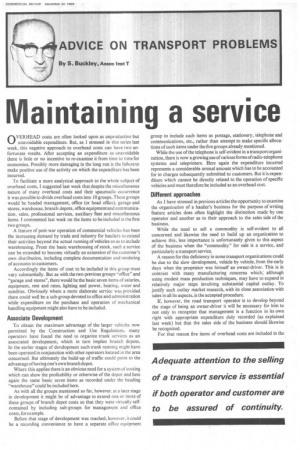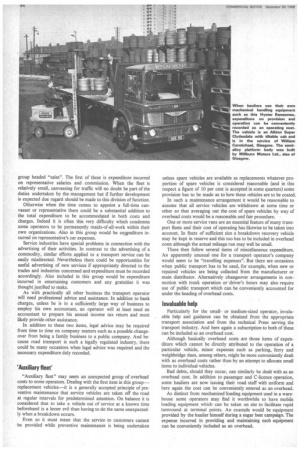Maintaining a service
Page 45

Page 46

If you've noticed an error in this article please click here to report it so we can fix it.
OVERHEAD costs are often looked upon as unproductive but unavoidable expenditure. But, as I stressed in this series last week, this negative approach to overhead costs can have two unfortunate results. After accepting an expenditure as unavoidable there is little or no incentive to re-examine it from time to time for economies. Possibly more damaging in the long run is the failure to make positive use of the activity on which the expenditure has been incurred.
To facilitate a more analytical approach to the whole subject of overhead costs, I suggested last week that despite the miscellaneous nature of many overhead costs and their spasmodic occurrence it was possible to divide overhead costs into 10 groups. These groups would be headed management, office (or head office), garage and stores, warehouse, branch depots, office equipment and communicadon, sales, professional services, auxiliary fleet and miscellaneous items. I commented last week on the items to be included in the first two groups.
A feature of post-war operation of commercial vehicles has been the increasing demand by trade and industry for hauliers to extend their activities beyond the actual running of vehicles so as to include warehousing. From the basic warehousing of stock, such a service can be extended to become vittually an extension of the customer's own distribution, including complete documentation and rendering of accounts to customers.
Accordingly the items of cost to be included in this group must vary substantially. But as with the two previous groups "office" and "garage and stores", there would be the basic seven items of salaries, equipment, rent and rates, lighting and power, heating, water and sundries. Obviously where a more elaborate service was provided there could well be a sub-group devoted to office and administration while expenditure on the purchase and operation of mechanical handling equipment might also have to be included.
Associate Development
To obtain the maximum advantage of the larger vehicles now permitted by the Construction and Use Regulations, many operators have found the need to organize trunk services as an associated development, which in turn implies branch depots. In the earlier stages of development such trunk running might have been operated in conjunction with other operators located in the area concerned. But ultimately the build-up of traffic could point to the advantage of having one's own branch depot.
Where this applies there is an obvious need for a system of costing which can show the profitability or otherwise of the depot and here again the same basic seven items as recorded under the heading "warehouse" could be included here.
As with all the groups mentioned so far, however, at a later stage in development it might be of advantage to extend one or more of these groups of branch depot costs so that they were virtually selfcontained by including sub-groups for management and office costs, for example.
Before that stage of development was reached, however, it could be a recording convenience to have a separate office equipment group to include such items as postage, stationery, telephone and communications, etc., rather than attempt to make specific allocations of such items under the five groups already mentioned.
While the use of the telephone is self-evident in atransportorganization, there is now a growing use of various forms of radio-telephone systems and teleprinters. Here again the expenditure incurred represents a considerable annual amount which has to be accounted for in charges subsequently submitted to customers. But it is expenditure which cannot be directly related to the operation of specific vehicles and must therefore be included as an overhead cost.
Different approaches
As I have stressed in previous articles the opportunity to examine the organization of a haulier's business for the purpose of writing feature articles does often highlight the distinction made by one operator and another as to their approach to the sales side of the business.
While the need to sell a commodity is self-evident to all concerned and likewise the need to build up an organization to achieve this, less importance is unfortunately given to this aspect of the business when the "commodity" for sale is a service, and particularly a transport service.
A reason for this deficiency in some transport organizations could be due to the slow development, vehicle by vehicle, from the early days when the proprietor was himself an owner-driver. This is in contrast with many manufacturing concerns which, although using modest mass production techniques, may have to expand in relatively major steps involving substantial capital outlay. To justify such outlay market research, with its close association with sales in all its aspects, is the accepted procedure.
If, however, the road transport operator is to develop beyond the stage of being an owner-driver it will be necessary for him to not only to recognize that management is a function in its own right with appropriate expenditure duly recorded (as explained last week) but that the sales side of the business should likewise be recognized.
For that reason five items of overhead costs are included in the group headed "sales". The first of these is expenditure incurred on representative salaries and commission. When the fleet is relatively small, canvassing for traffic will no doubt be part of the duties undertaken by the management but if further development is expected due regard should be made to this division of function.
Otherwise when the time comes to appoint a full-time canvasser or representative there could be a substantial addition to the total expenditure to be accommodated in both costs and charges. Indeed it is often this very difficulty which condemns some operators to be permanently maids-of-all-work within their own organizations. Also in this group would be exppnditure incurred on representative's car expenses.
Service industries have special problems in connection with the advertising of their activities. In contrast to the advertising of a commodity, similar efforts applied to a transport service can be easily misdirected. Nevertheless there could be opportunities for useful advertising of new services if appropriately directed to the trades and industries concerned and expenditure must be recorded accordingly. Also included in this group would be expenditure incurred in entertaining customers and any gratuities it was thought justified to make.
As with practically all other business the transport operator will need professional advice and assistance. In addition to bank charges, unless he is in a sufficiently large way of business to employ his own accountant, an operator will at least need an accountant to prepare his annual income tax return and most likely provide other assistance.
In addition to these two items, legal advice may be required from time to time on company matters such as a possible changeover from being a family business to a public company. And because road transport is such a legally regulated industry, there could be many occasions when legal advice was required and the necessary expenditure duly recorded.
'Auxiliary fleet'
"Auxiliary fleet" may seem an unexpected group of overhead costs to some operators. Dealing with the first item in this group— replacement vehicles—it is a generally accepted principle of preventive maintenance that service vehicles are taken off the road at regular intervals for predetermined attention. On balance it is considered that to take a vehicle out of service at a known time beforehand is a lesser evil than having to do the same unexpectedly when a breakdown occurs.
Even so it must mean that the service to customers cannot be provided while preventive maintenance is being undertaken unless spare vehicles are available as replacements whatever proportion of spare vehicles is considered reasonable (and in this respect a figure of 10 per cent is accepted in some quarters) some provision has to be made as to how these vehicles are to be costed.
In such a maintenance arrangement it would be reasonable to assume that all service vehicles are withdrawn at some time or other so that averaging out the cost of spare vehicles by way of overhead costs would be a reasonable and fair procedure.
One or more service vans are an essential feature of many transport fleets and their cost of operating has likewise to be taken into account. In fleets of sufficient size a breakdown recovery vehicle may be kept in reserve and this too has to be included in overhead costs although the actual mileage run may well be small.
There then follow several items of miscellaneous expenditure. An apparently unusual one for a transport operator's company would seem to be "travelling expenses". But there are occasions when public transport has to be used, for example, when new or repaired vehicles are being collected from the manufacturer or main distributor. Alternatively changeover arrangements in connection with trunk operation or driver's hours may also require use of public transport which can be conveniently accounted for under the heading of overhead costs.
Invaluable help
Particularly for the smallor medium-sized operator, invaluable help and guidance can be obtained from the appropriate transport association and from the technical Press serving the transport industry. And here again a subscription to both of these can be included as an overhead cost.
Although basically overhead costs are those items of expenditure which cannot be directly attributed to the operation of a particular vehicle, minor expenses such as parking, ferry and weighbridge dues, among others, might be more conveniently dealt with as overhead costs rather than by an attempt to allocate small items to individual vehicles. '
Bad debts, should they occur, can similarly be dealt with as an overhead cost. In addition to passenger and C-licence operation, some hauliers are now issuing their road staff with uniform and here again the cost can be conveniently entered as an overhead.
As distinct from mechanized loading equipment used in a warehouse some operators may find it worthwhile to have mobile loading equipment which can be taken on site to facilitate rapid turnround at terminal points. An example would be equipment provided by the haulier himself during a sugar beet campaign. The expense incurred in providing and maintaining such equipment can be conveniently included as an overhead.




















































































